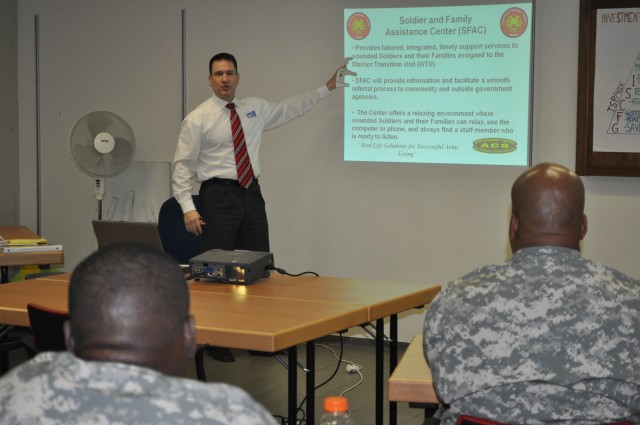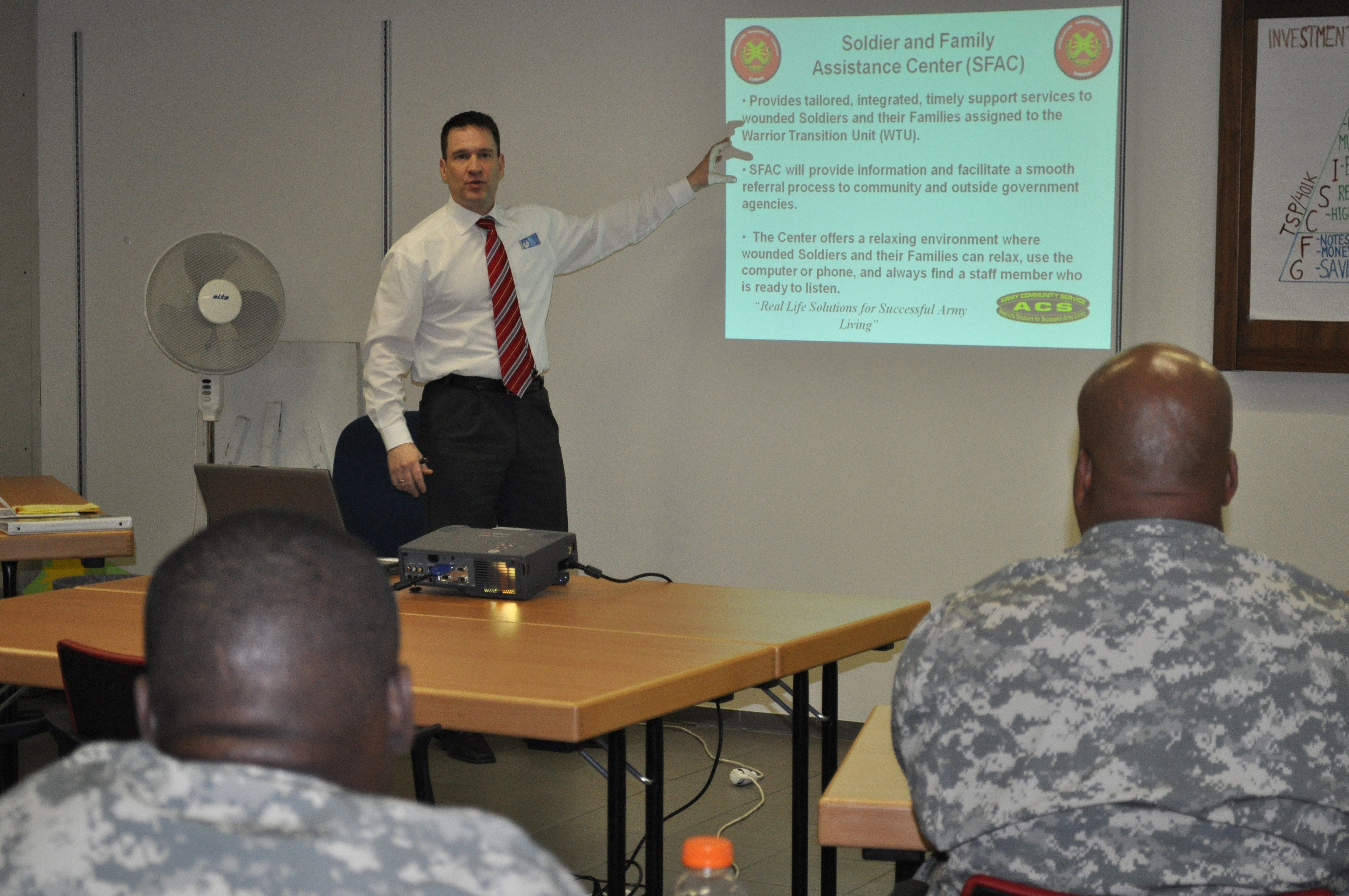BAMBERG, Germany -- Soldiers at U.S. Army Garrison Bamberg will now transition to and from the post virtually through a groundbreaking new process developed by Military Personnel Division employees and post commander Lt. Col. Steven L. Morris.
The process, which runs through U.S. Army Europe Community Automation System, cuts the hard copies of in- and out-processing forms to a minimum and eliminates the need for post organizations to sign off on and manually input clearing paperwork.
Prior to adapting the process, Warner Barracks Soldiers had 88 listed agencies to visit when coming to or clearing post. Electronic files maintained by each of the post's organizations and connected to CPF will cut the process for many Soldiers in half.
"The new process will also ensure that each and every Soldier and their Family who comes to Bamberg is taken care of properly," Morris said.
A USAREUR program, UCAS is a central database, accessible through Army Knowledge Online, containing relevant information for in- and out-processing individuals to include orders, leave forms and sponsor requests. While the system is efficient and well-organized, the transference of individual and agency information is still mainly dependent on hard paperwork and manual sign-offs.
Recognizing the potential of UCAS to increase efficiency virtually, Morris approached MPD personnel and went through a schematic to further utilize the system.
"We have so many data systems that don't speak to one another," said Duane Kozel, director of Human Resources at Warner Barracks. "[This new process] is very, very efficient. We were able to go in and make some modifications to the electronic part and what's good is the software was created very strong."
Warner Barracks' Central Process Facility Manager Lee Morey works directly with in- and out-processing personnel on a daily basis and was the technical expert for increasing the use of the virtual application.
"There are no more stamps, no more signatures, everything's electronic," Morey said. "[Soldiers] go around to each of the agencies, the agency goes on the computer, processes and that's it. No leave forms. Everything is at a central location."
The only thing that has not moved to an electronic format is the unit portion, where the Soldier has to take that around to company personnel.
"With the system we have right now, there's no way it would be able to handle that many users," Morey said. "Ten days before they leave they get their clearing papers; ten days before that, in the system, it automatically moves them to a pre-clearance status. The agencies go in there within those 10 days and click yes I need to see the Soldier or no I don't. When they click no I don't, it enters automatically...so now instead of visiting 88 places, they may only have to visit 40."
The workload for personnel at various post agencies has drastically improved by the move to a virtually-based system.
Employees at these agencies need only a computer and either in the morning or afternoon, they can view who needs a pre-clearance and go through a list in a matter of seconds, Morey said.
"Think of the time the employee had to take, the disruption of time," Kozel said. "Part of this is you had to take the physical form on paper and then someone had to transpose that information to UCAS anyway. That was a totally eliminated step in the whole process and reduces labor tremendously as well.
Implemented Jan. 3, Bamberg personnel and Soldiers are currently transitioning virtually.
"My expectations are high because it's supposed to be very good," said Staff Sgt. Frederick Edwards, a new Soldier with 16th Special Troops Battalion. "We're the test, the trial phase, but I expect it to especially help the new Soldiers."
The biggest issue with the traditional system recognized by MPD personnel was people losing paperwork and not having enough copies of orders, said MPD chief Michael Martin. The garrison spends more than 40,000 euro a year on paper.
The new process also improves security by eliminating a Soldier's ability to forge signatures on clearing paperwork, which Kozel said has been an issue at some locations.
Soldiers are not the only ones to benefit from a more virtual system. Family members and children are also expected to experience the advantages. Now that various organizations will all be tracking new community members online, in-processing Soldiers can more easily gain access to waiting lists for housing and child care.
Though some agencies were reluctant to adjust their system, Kozel said most employees have recognized the ease and efficiency of a virtually-based system.
Though UCAS is able to contain more information than it is typically used for, most other military installations have yet to cut paper, signatures and stamps from in- and out-processing. MPD personnel have ensured that out-processing Soldiers do have a physical packet to carry to their next duty station.
"We will actually print out a hard copy," Morey said. "And then we'll put a final stamp on there so that when they go to the next community they have something in their hands that shows they have out-processed."
For now, MPD will continue to track the progress of the first Soldiers completing the process virtually and adjust as needed.
"What I'm hoping will happen with us is we get USAREUR, (Installation Management Command) and everyone on the same sheet of music," Martin said.
The men and women working on this virtual system plan on improving another system as well.
"This is the first step in the two-step process weAca,!a,,c'e working on," Kozel said. "By the end of March we're going to have part B in place."
That second part involves sponsorship. To ensure sponsors are fulfilling their obligations to new Soldiers, the group is working to add a feature to UCAS that makes the sponsor visible to certain MPD personnel and the post commander. When a sponsor does not follow through with his duties, the post commander will be alerted as well as the unit commander.
Soldiers are leaving Advanced Individual Training without enough information, Martin said.
"Having a sponsor is crucial for Soldiers to have a great start at their new duty station," Morris said. "Sponsorship is one of our priorities. Virtual in-processing allows us to streamline this process and track the Soldier from start to end. Being able to track Soldiers to ensure they have a sponsor is a huge step in the right direction.
"We will continue to work unit sponsorship and the virtual in- and out-processing system until every Soldier is sponsored prior to departure from their last duty station through full integration with their new unit," Morris said.
This makes a sponsor's role extremely important, but according to Kozel the program needs to incorporate a system of rewards and maybe allocate one sponsor for a group of incoming Soldiers to lessen the amount of men and women leaving their duties.
The UCAS sponsorship addition is due to go into effect in March.


Social Sharing